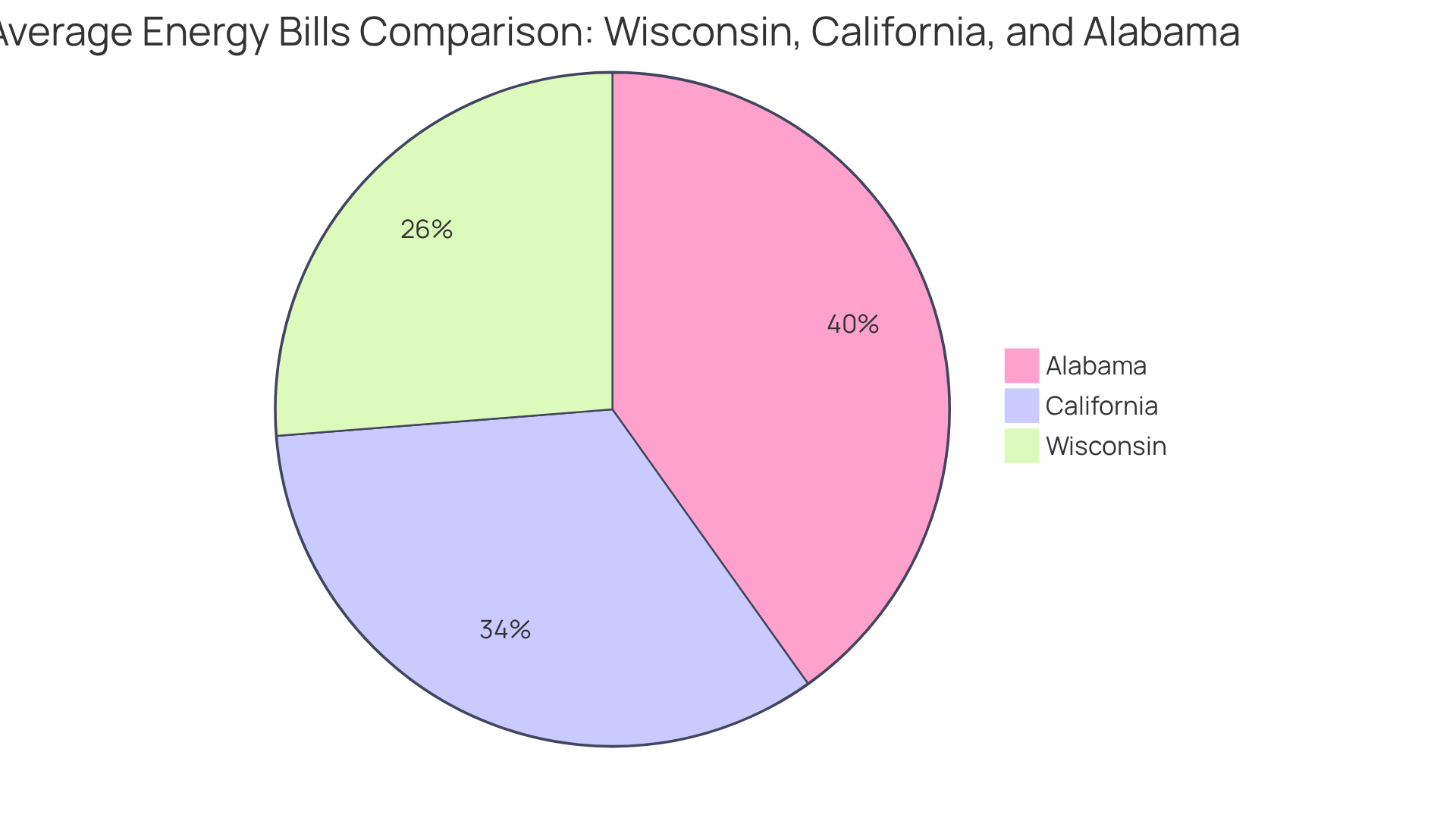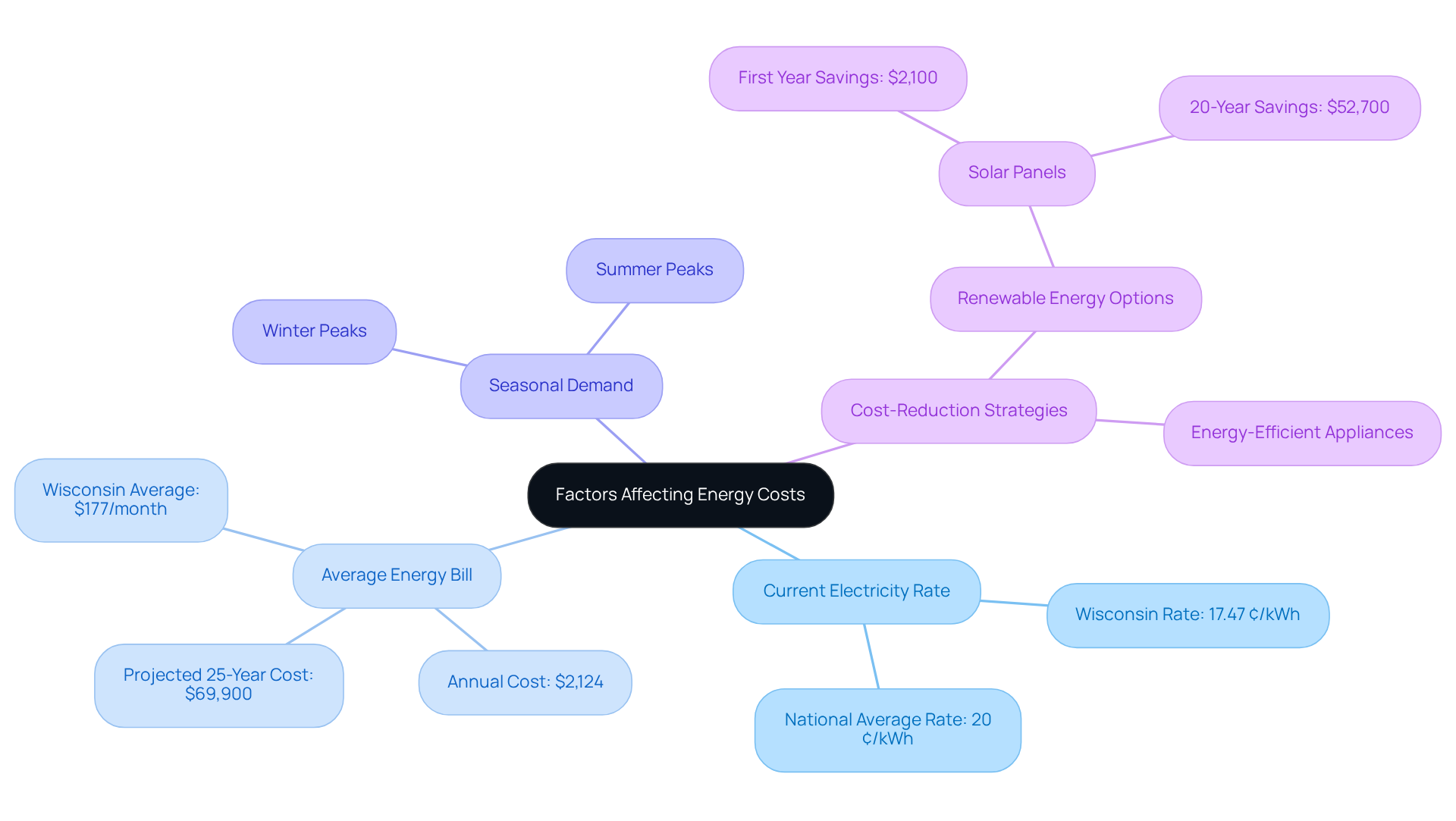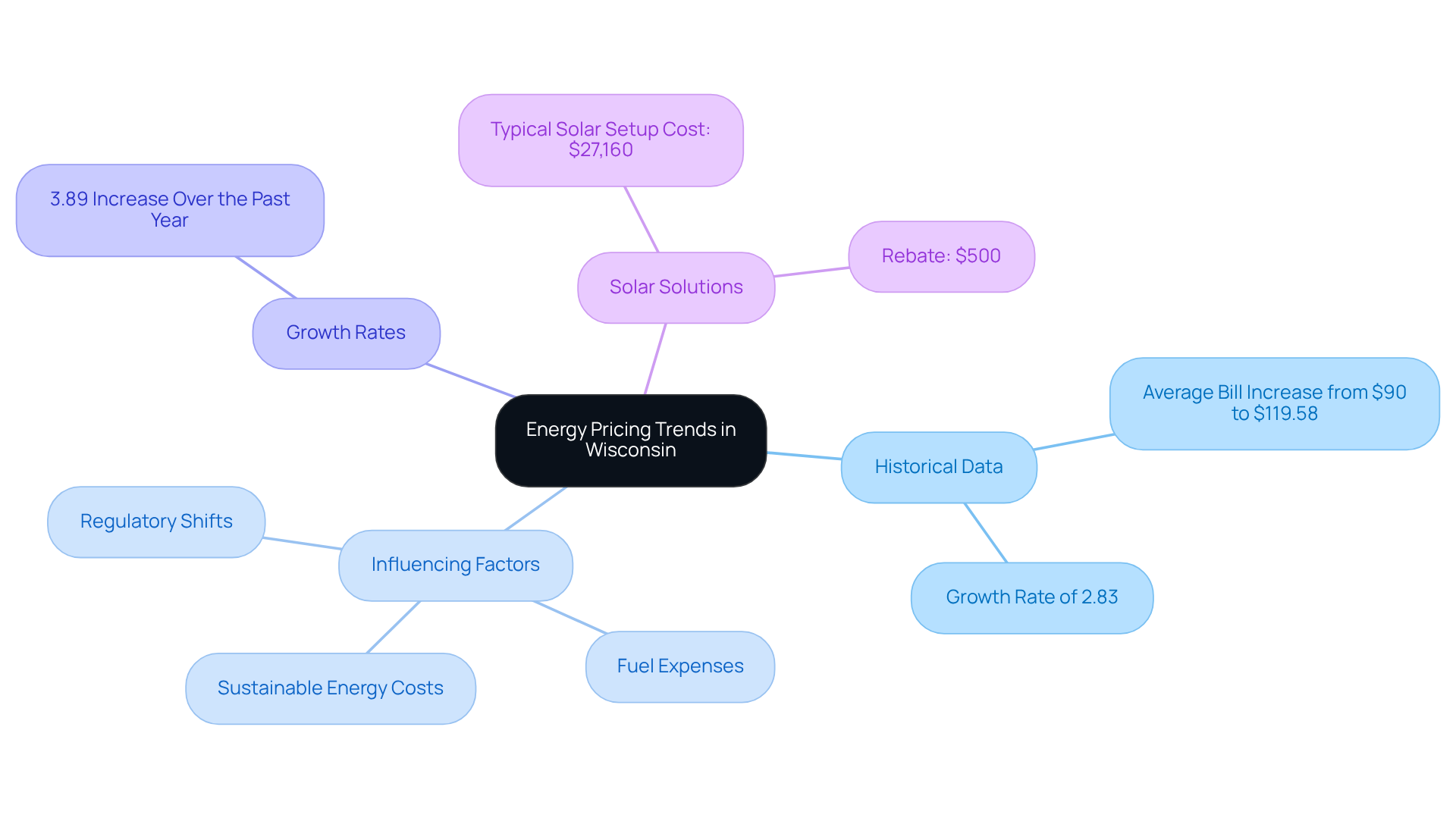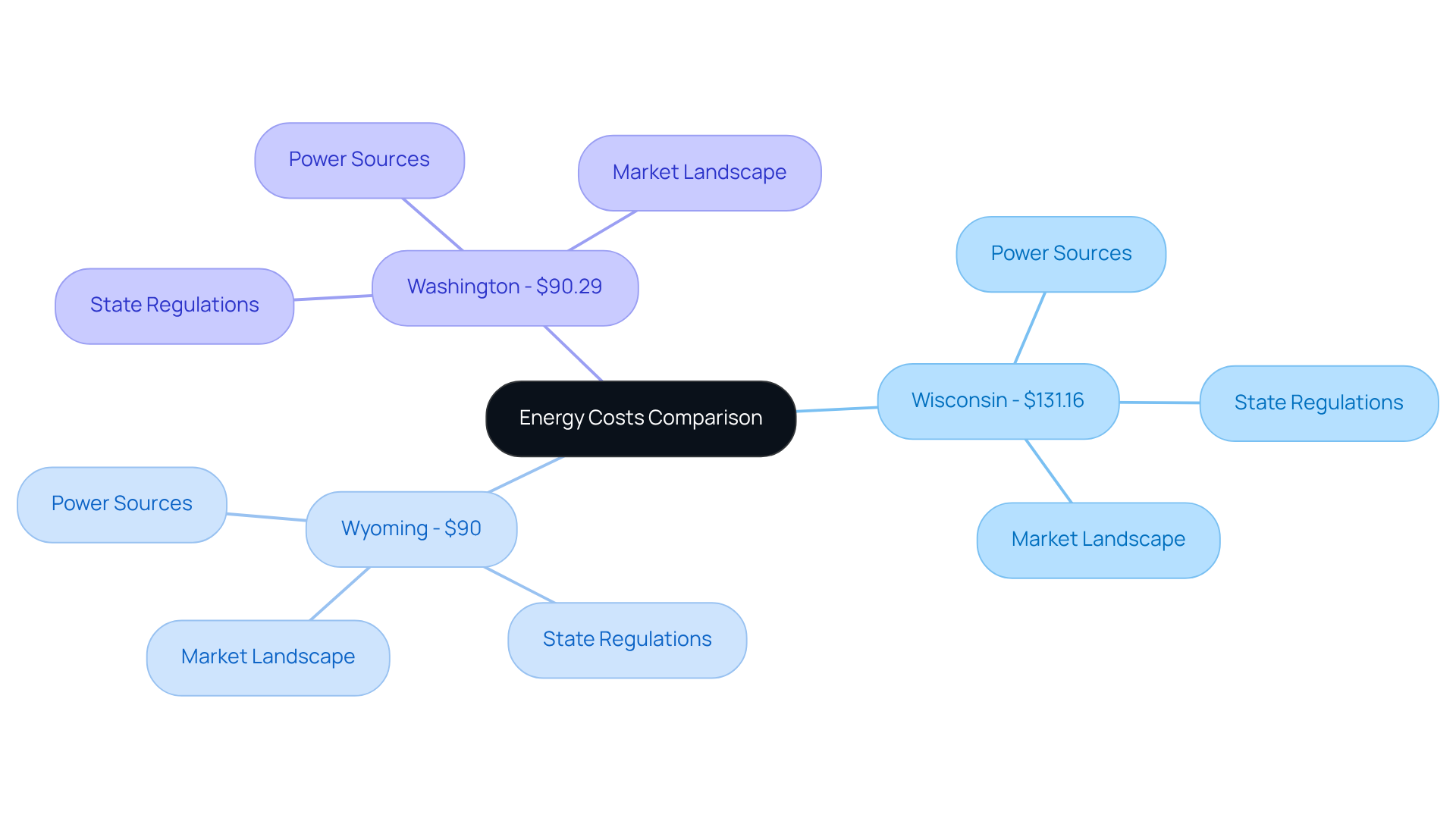Overview
We understand that managing energy bills can be a significant concern for homeowners. As of July 2025, the average energy bill in Wisconsin is approximately $121.89, reflecting a typical monthly electricity expense. This figure is not only lower than the national average, but it also highlights the potential for residents to take control of their energy costs. Factors such as seasonal demand, energy efficiency measures, and the adoption of renewable energy sources play a crucial role in this context.
By embracing these solutions, you can not only manage your expenses but also contribute to a more sustainable future. Together, we can explore ways to reduce your energy costs and promote energy independence.
Have you considered how solar energy could benefit your household? It’s common to feel overwhelmed by the options, but we are here to support you every step of the way. Let’s work towards achieving a more efficient and cost-effective energy solution for your home.
Introduction
Understanding the dynamics of energy costs can feel overwhelming for homeowners in Wisconsin, especially with the average energy bill hovering around $121.89. While this amount may be lower than in many other states, it can still vary due to seasonal demands and individual household habits. Many residents find themselves grappling with the challenge of managing these expenses.
By exploring the factors that influence these costs and considering energy-efficient solutions, you can uncover strategies to reduce your bills and enhance your energy independence.
How can we, as Wisconsin homeowners, navigate the complexities of energy pricing while fostering a more sustainable future together?
Define Average Energy Bill in Wisconsin
We understand that for many homeowners in Wisconsin, managing the average energy bill can be a source of stress. The average energy bill in Wisconsin reflects the typical monthly expense incurred for electricity consumption, which, as of July 2025, is approximately $121.89 based on a usage of around 684 kWh. This figure can vary due to seasonal changes, efficiency measures, and individual household habits. For perspective, California’s typical electricity charge is significantly higher at $155.99, while Alabama’s typical cost stands at $186.37. This indicates that homeowners in Wisconsin enjoy relatively lower expenses, which is a comforting thought.
It’s common to feel overwhelmed by these costs, but understanding the average energy bill in Wisconsin is crucial for assessing your own expenses and exploring possible savings through energy-efficient solutions. By adopting practices that promote energy efficiency, you can significantly reduce your bills while contributing to a more sustainable lifestyle.
Moreover, if you find yourself facing elevated electricity costs, there are support programs available from energy suppliers that can provide assistance, such as payment extensions or waived late charges. Together, we can navigate these challenges and work towards a more energy-independent future. Let’s explore how you can take meaningful steps towards reducing your energy bills and fostering a sense of community in this journey.

Examine Factors Affecting Energy Costs
We understand that the average energy bill in Wisconsin can be a significant concern for homeowners. As of July 2025, the typical electricity rate here stands at around 17.47 cents per kilowatt-hour (kWh), which is 13% lower than the national average. However, many residents still face an average energy bill in Wisconsin of about $177, which reflects a total power usage of roughly 1,018 kWh each month. Seasonal peaks, especially during the winter and summer months, can drive up demand and consequently increase prices, leaving many feeling overwhelmed.
But there is hope. By investing in energy-efficient appliances, you can effectively manage these costs and reduce overall consumption. Moreover, exploring renewable energy options, such as solar panels, can significantly lessen your reliance on grid electricity. Imagine saving an average of $2,100 in the first year and potentially up to $52,700 over 20 years. These strategies not only help you save money but also contribute to a more sustainable future for our community.
It’s common to feel uncertain about navigating these changes, but together we can explore these options. By adopting energy-efficient practices, you can take control of your energy bills while fostering a healthier environment for everyone. If you’re ready to learn more about how to make these changes, let’s work towards a brighter, more sustainable future together.

Trace Historical Trends in Energy Pricing
We understand that the average energy bill in Wisconsin can be a significant concern for homeowners. Over recent decades, pricing for power has undergone substantial changes, influenced by regulatory shifts, fuel expenses, and evolving power policies. The average energy bill in Wisconsin has increased from about $90 in the early 2000s to nearly $119.58 in 2025. This trend reflects the increasing operational expenses for utility firms and the substantial investments being made in infrastructure. Moreover, the transition to more sustainable power sources, while beneficial for the environment, often comes with higher upfront costs.
It’s common to feel overwhelmed by these changes. Historical data shows that the average energy bill in Wisconsin reflects a typical growth rate of approximately 2.83%, with a notable increase of 3.89% over the past year alone. Recognizing these trends can empower homeowners to better anticipate future expenses and explore efficient solutions, such as solar installations. Have you considered how investing in solar power could save you hundreds of dollars each year on your electricity needs? The typical residential solar panel setup is priced at around $27,160, and homeowners can expect to recover their installation costs in roughly 13 years, making solar a financially feasible choice.
Additionally, Wisconsin residents can take advantage of the Focus On Energy program, which offers a $500 rebate for solar purchases. Together, we can navigate these dynamics to make informed choices regarding resource consumption and efficiency enhancements. Let’s work towards a more sustainable future, where you can enjoy energy independence and peace of mind about your energy bills.

Compare Energy Costs Across Different Regions
We understand that managing power expenses can be a significant concern for homeowners in Wisconsin, especially considering that the average energy bill Wisconsin faces is $131.16, which ranks the state among the top ten for high power costs. In contrast, states like Wyoming and Washington enjoy much lower average bills, around $90 and $90.29, respectively. These disparities can stem from various factors, including power sources, state regulations, and the overall market landscape.
It’s common to feel overwhelmed by these costs, but exploring alternative energy solutions, such as solar installations, can be a transformative step. Not only can solar energy help offset the average energy bill in Wisconsin, but it also enhances your energy independence, allowing you to take control of your energy future.
Together, we can work towards a more sustainable and affordable energy solution. By considering solar energy, you’re not just making a financial decision; you’re investing in a cleaner, more resilient future for your home and community. If you’re interested in learning more about how solar can benefit you, please reach out. We’re here to support you on this journey towards energy independence.

Conclusion
Understanding the average energy bill in Wisconsin is essential for homeowners navigating their financial landscape. With the current average monthly expense of approximately $121.89, many find this figure manageable compared to states like California and Alabama. While this lower cost may bring a sense of relief, it underscores the need for awareness and proactive measures to keep energy bills sustainable.
We recognize that several factors influence energy costs in Wisconsin, including:
- Seasonal demand fluctuations
- Historical pricing trends
As energy bills have gradually increased over the years, there’s an opportunity for homeowners to invest in energy-efficient appliances and explore renewable options like solar energy. Not only do these strategies promise substantial savings, but they also contribute to a more sustainable environment, fostering a sense of community responsibility.
Ultimately, taking control of energy expenses goes beyond mere bill management; it’s about embracing a future where energy independence and sustainability are attainable. By considering energy-efficient practices and renewable energy sources, homeowners in Wisconsin can pave the way for a more secure and eco-friendly energy future. We encourage you to engage with available programs and resources that can enhance this journey, empowering you to make informed choices that benefit both your wallet and our planet. Together, we can create a brighter, more sustainable future.


